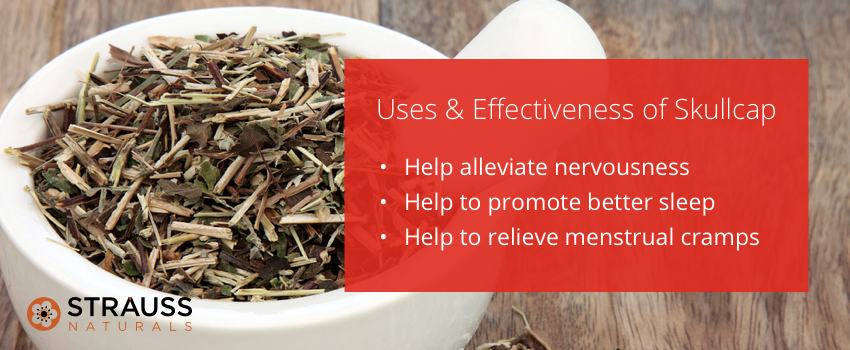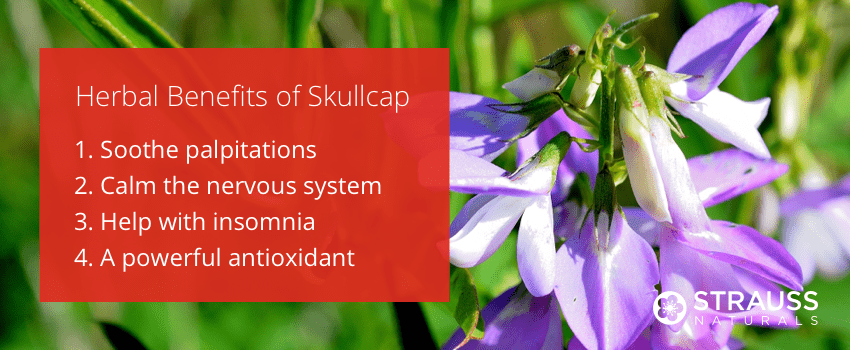
Skullcap Overview
Skullcap, also known as scullcap, is the common name for Scutellaria, a variety of flowering plants in the mint family. Derived from the Latin word scutella, which translates to "little dish," skullcap grows a cluster of tiny purple flowers with a dish-like helmet shape. Skullcap can refer to 2 herbs:- American skullcap: Scutellaria lateriflora
- Chinese skullcap: Scutellaria baicalensis
General Information of Skullcap
Skullcap was introduced into traditional American medicine toward the end of the 1700s and was referred to as "mad dog" as it was used to treat rabies. Later, it was used as a tonic, to treat "female hysteria." The plant was used as an herbal sedative, especially when mixed with valerian, a perennial flowering plant native to Europe and Asia. Skullcap is traditionally used to treat nervousness, irritability, and nerve damage. Some chemicals found in the skullcap plant may work by preventing swelling or inflammation. Other chemicals in skullcap are believed to cause sedation. (WebMD) Today, skullcap is sold in North America in the form of capsules, powders, tinctures, and liquid extracts. Dried parts of the plant, such as its leaves, are used to brew tea.What is Skullcap Used For?
Many herbalists, including Medical herbalist David Hoffman, consider skullcap to be among the best nervine tonics, strengthening, supporting, and quieting the entire nervous system. As a nervine, it is helpful in all conditions that may have a nervous or anxious origin or cause, and in all exhausted or depressed conditions. In 2003, a double-blind, placebo-controlled study in 19 healthy volunteers aimed to clarify skullcap's effectiveness in reducing anxiety. Subjective endpoints were used to evaluate the herb's effects, noting their energy, cognition, and anxiety. A higher level of sedation was seen at greater doses, which indicates an anxiolytic (a medication, or other intervention, that reduces anxiety) property of skullcap compared to placebo. (source)
Uses & Effectiveness of Skullcap
Skullcap was traditionally used for a variety of conditions. While more information is needed as to how beneficial this ancestral medicine is, people have usually used skullcap in herbal medicine to:- help alleviate nervousness
- help to promote better sleep
- help to relieve menstrual cramps
Precautions of Skullcap
Consult with a doctor before introducing skullcap into your routine, especially if you are pregnant or breastfeeding or are anticipating surgery, as skullcap may slow down the central nervous system. It is advised that you stop taking skullcap at least two weeks before the scheduled surgery. Both American and Chinese skullcap are associated with liver damage and, in extreme cases, liver failure. LiverTox notes that these cases mostly concerned supplements that comprised multiple herbs, not just skullcap. People with conditions that impact liver function should avoid this plant and talk with their healthcare provider.Is the Skullcap Herb Safe?
Due to insufficient research, Skullcap is not recommended for children or pregnant or breastfeeding women. Consult with your practitioner before taking any form of skullcap.
Herbal Benefits of Skullcap
1) Soothe Palpitations
Heart palpitations are a common side effect of anxiety. They can feel like your heart is racing, pounding, or in extreme cases, feel as if you have an irregular heartbeat. Limited evidence suggests that healthy people who take a single dose of skullcap extract might feel more relaxed than tense for about 2 hours, lowering the chances of increased heart palpitations.2) Calm the Nervous System
For over two centuries, American skullcap has been used by both Americans and Europeans as a nerve tonic to help treat anxiety. American skullcap has been shown to boost mood and reduce symptoms of anxiety. A study funded by the Institute of Health and Wellbeing found that those who received a dose of 1,050 mg of American skullcap daily for two weeks reported significant enhancements in mood compared to a placebo group. Researchers believe that the American skullcap impacts mood and reduces anxiety by stimulating gamma-aminobutyric acid (GABA), a neurotransmitter that helps calm nerves. Many anti-anxiety medications work similarly by enhancing GABA activity. Before the invention of pharmaceutical tranquilizers, Skullcap was the go-to herb to relieve anxiety and nervous tension. It was believed to be one of the best nerves and antispasmodics given to humanity.3) Help With Insomnia
While there is limited research, the effects of treating insomnia in traditional medical practices point to baicalin, a vital flavonoid compound found in both American and Chinese skullcap. Skullcap promotes sound sleep without unwanted side effects, leaving users refreshed and revitalized in the morning.4) A Powerful Antioxidant
Both American and Chinese skullcap contain various beneficial plant compounds, including antioxidants, which have anti-inflammatory effects and protect your cells from damage caused by free radicals. Baicalin, a flavonoid antioxidant in the skullcap, may help combat oxidative stress. Oxidative stress, which results from an imbalance between free radicals and antioxidants, is linked to several chronic conditions. Chinese and American skullcap contain many other anti-inflammatory compounds. Over 50 flavonoids have been isolated from the Chinese species!How To Take Skullcap
People generally take 1–2 grams (2 ml) of skullcap throughout the day, though the dosage will depend on the supplement you take. Skullcap is also available as a tea infused with other calming herbs; however, they may not have the same effect as they are less concentrated.FAQs
What Are the Side Effects Of Skullcap?
While used for decades for their positive results, herbs can trigger side effects and interact with other herbs, supplements, or medications. Take herbs with care American skullcap has been contaminated with germander (Teucrium), an assortment of plants known to cause liver problems, so you must always purchase it from a reputable source. Extremely high doses of American skullcap tincture may cause:- Giddiness
- Stupor
- Mental confusion
- Twitching
- Irregular heartbeat
- Seizures
How To Make a Herbal Skullcap Chamomile Tea
Herbalist Richard Whelan has noticed in his clinical use of Skullcap that in strong doses has quite a calming effect on agitated individuals. Teas prepared from Scutellaria species also seem to have evident antibacterial and antifungal activity. Here's how to make your own skullcap chamomile tea infusion:- Boil a quarter gallon of water per ounce of herb mixture at a 1:1 ratio.
- Pour water over the herbs and let soak for 30-60 minutes.
- When you are ready to taste, add honey if needed.
- Let cool and store for up to four days.

